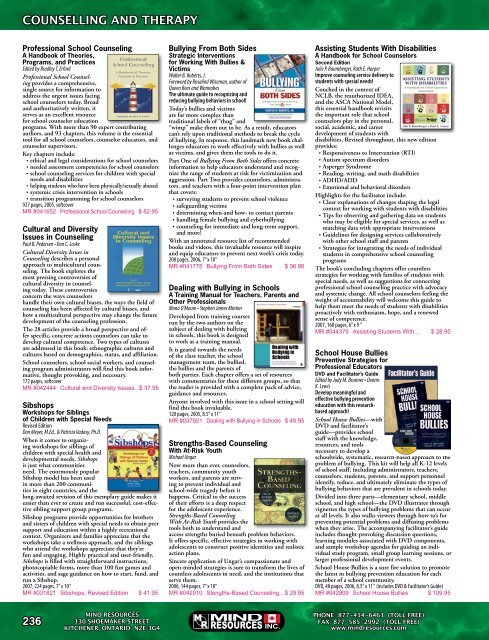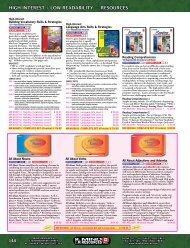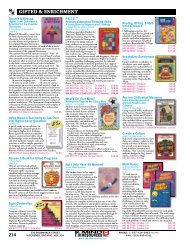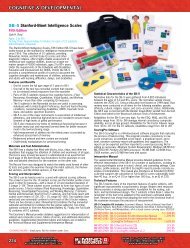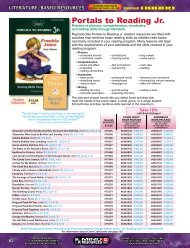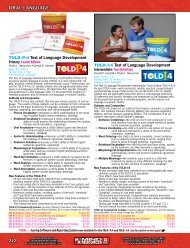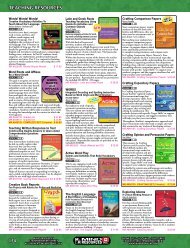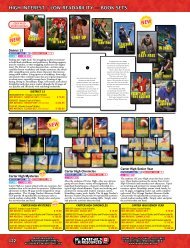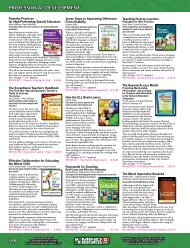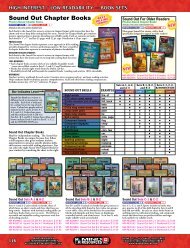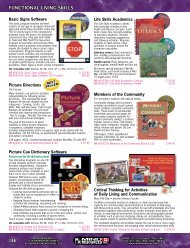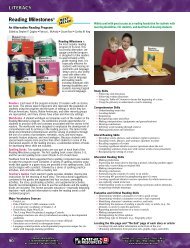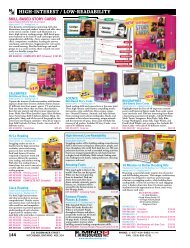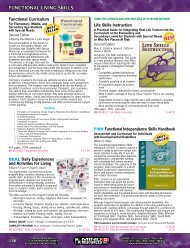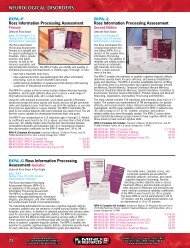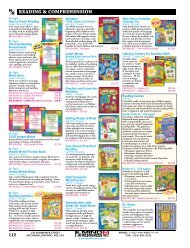Counselling and Therapy (pages 236-245) - Mind Resources
Counselling and Therapy (pages 236-245) - Mind Resources
Counselling and Therapy (pages 236-245) - Mind Resources
You also want an ePaper? Increase the reach of your titles
YUMPU automatically turns print PDFs into web optimized ePapers that Google loves.
COUNSELLING AND THERAPY<br />
Professional School Counseling<br />
A H<strong>and</strong>book of Theories,<br />
Programs, <strong>and</strong> Practices<br />
Edited by Bradley T. Erford<br />
Professional School Counseling<br />
provides a comprehensive,<br />
single source for information to<br />
address the urgent issues facing<br />
school counselors today. Broad<br />
<strong>and</strong> authoritatively written, it<br />
serves as an excellent resource<br />
for school counselor education<br />
programs. With more than 90 expert contributing<br />
authors, <strong>and</strong> 93 chapters, this volume is the essential<br />
tool for all school counselors, counselor educators, <strong>and</strong><br />
counselor supervisors.<br />
Key chapters include:<br />
• ethical <strong>and</strong> legal considerations for school counselors<br />
• needed assessment competencies for school counselors<br />
• school counseling services for children with special<br />
needs <strong>and</strong> disabilities<br />
• helping students who have been physically/sexually abused<br />
• systemic crisis intervention in schools<br />
• transition programming for school counselors<br />
927 <strong>pages</strong>, 2005, softcover<br />
MR #041652 Professional School Counseling $ 82.95<br />
Cultural <strong>and</strong> Diversity<br />
Issues in Counseling<br />
Paul B. Pedersen • Don C. Locke<br />
Cultural Diversity Issues in<br />
Counseling describes a personal<br />
approach to multicultural counseling.<br />
The book explores the<br />
most pressing controversies of<br />
cultural diversity in counseling<br />
today. These controversies<br />
concern the ways counselors<br />
h<strong>and</strong>le their own cultural biases, the ways the field of<br />
counseling has been affected by cultural biases, <strong>and</strong><br />
how a multicultural perspective may change the future<br />
development of the counseling profession.<br />
The 28 articles provide a broad perspective <strong>and</strong> offer<br />
specific, concrete actions counselors can take to<br />
develop cultural competence. Two types of cultures<br />
are addressed in this book: ethnographic cultures <strong>and</strong><br />
cultures based on demographics, status, <strong>and</strong> affiliation.<br />
School counselors, school social workers, <strong>and</strong> counseling<br />
program administrators will find this book informative,<br />
thought provoking, <strong>and</strong> necessary.<br />
172 <strong>pages</strong>, softcover<br />
MR #042444 Cultural <strong>and</strong> Diversity Issues... $ 37.95<br />
Sibshops<br />
Workshops for Siblings<br />
of Children with Special Needs<br />
Revised Edition<br />
Don Meyer, M.Ed., & Patricia Vadasy, Ph.D.<br />
When it comes to organizing<br />
workshops for siblings of<br />
children with special health <strong>and</strong><br />
developmental needs, Sibshops<br />
is just what communities<br />
need. The enormously popular<br />
Sibshop model has been used<br />
in more than 200 communities<br />
in eight countries, <strong>and</strong> the<br />
long-awaited revision of this exemplary guide makes it<br />
easier than ever to create <strong>and</strong> run successful, cost-effective<br />
sibling support group programs.<br />
Sibshop programs provide opportunities for brothers<br />
<strong>and</strong> sisters of children with special needs to obtain peer<br />
support <strong>and</strong> education within a highly recreational<br />
context. Organizers <strong>and</strong> families appreciate that the<br />
workshops take a wellness approach, <strong>and</strong> the siblings<br />
who attend the workshops appreciate that they’re<br />
fun <strong>and</strong> engaging. Highly practical <strong>and</strong> user-friendly,<br />
Sibshops is filled with straightforward instructions,<br />
photocopiable forms, more than 100 fun games <strong>and</strong><br />
activities, <strong>and</strong> sage guidance on how to start, fund, <strong>and</strong><br />
run a Sibshop.<br />
2007, 224 <strong>pages</strong>, 7” x 10”<br />
MR #031821 Sibshops, Revised Edition $ 41.95<br />
Bullying From Both Sides<br />
Strategic Interventions<br />
for Working With Bullies &<br />
Victims<br />
Walter B. Roberts, J.<br />
Foreword by Rosalind Wiseman, author of<br />
Queen Bees <strong>and</strong> Wannabes<br />
The ultimate guide to recognizing <strong>and</strong><br />
reducing bullying behaviors in school!<br />
Today’s bullies <strong>and</strong> victims<br />
are far more complex than<br />
traditional labels of “thug” <strong>and</strong><br />
“wimp” make them out to be. As a result, educators<br />
can’t rely upon traditional methods to break the cycle<br />
of bullying. In response, this l<strong>and</strong>mark new book challenges<br />
educators to work effectively with bullies as well<br />
as victims, <strong>and</strong> gives them the tools to do it.<br />
Part One of Bullying From Both Sides offers concrete<br />
information to help educators underst<strong>and</strong> <strong>and</strong> recognize<br />
the range of students at risk for victimization <strong>and</strong><br />
aggression. Part Two provides counselors, administrators,<br />
<strong>and</strong> teachers with a four-point intervention plan<br />
that covers:<br />
• surveying students to prevent school violence<br />
• safeguarding victims<br />
• determining when-<strong>and</strong> how- to contact parents<br />
• h<strong>and</strong>ling female bullying <strong>and</strong> cyberbullying<br />
• counseling for immediate <strong>and</strong> long-term support,<br />
<strong>and</strong> more!<br />
With an annotated resource list of recommended<br />
books <strong>and</strong> videos, this invaluable resource will inspire<br />
<strong>and</strong> equip educators to prevent next week’s crisis today.<br />
208 <strong>pages</strong>, 2006, 7” x 10”<br />
MR #041775 Bullying From Both Sides $ 36.95<br />
Dealing with Bullying in Schools<br />
A Training Manual for Teachers, Parents <strong>and</strong><br />
Other Professionals<br />
Mona O’Moore • Stephen James Minton<br />
Developed from training courses<br />
run by the two authors on the<br />
subject of dealing with bullying<br />
in schools, this book is designed<br />
to work as a training manual.<br />
It is geared towards the needs<br />
of the class teacher, the school<br />
management team, the bullied,<br />
the bullies <strong>and</strong> the parents of<br />
both parties. Each chapter offers a set of resources<br />
with commentaries for these different groups, so that<br />
the reader is provided with a complete pack of advice,<br />
guidance <strong>and</strong> resources.<br />
Anyone involved with this issue in a school setting will<br />
find this book invaluable.<br />
120 <strong>pages</strong>, 2005, 8.5” x 11”<br />
MR #037921 Dealing with Bullying in Schools $ 48.95<br />
Strengths-Based Counseling<br />
With At-Risk Youth<br />
Michael Ungar<br />
Now more than ever, counselors,<br />
teachers, community youth<br />
workers, <strong>and</strong> parents are striving<br />
to prevent individual <strong>and</strong><br />
school-wide tragedy before it<br />
happens. Critical to the success<br />
of their efforts is a deep respect<br />
for the adolescent experience.<br />
Strengths-Based Counseling<br />
With At-Risk Youth provides the<br />
tools both to underst<strong>and</strong> <strong>and</strong><br />
access strengths buried beneath problem behaviors.<br />
It offers specific, effective strategies in working with<br />
adolescents to construct positive identities <strong>and</strong> realistic<br />
action plans.<br />
Sincere application of Ungar’s compassionate <strong>and</strong><br />
open-minded strategies is sure to transform the lives of<br />
countless adolescents in need, <strong>and</strong> the institutions that<br />
serve them.<br />
2006, 144 <strong>pages</strong>, 7” x 10”<br />
MR #042910 Stengths-Based Counseling... $ 29.95<br />
Assisting Students With Disabilities<br />
A H<strong>and</strong>book for School Counselors<br />
Second Edition<br />
Julie P. Baumberger, Ruth E. Harper<br />
Improve counseling service delivery to<br />
students with special needs!<br />
Couched in the context of<br />
NCLB, the reauthorized IDEA,<br />
<strong>and</strong> the ASCA National Model,<br />
this essential h<strong>and</strong>book revisits<br />
the important role that school<br />
counselors play in the personal,<br />
social, academic, <strong>and</strong> career<br />
development of students with<br />
disabilities. Revised throughout, this new edition<br />
provides:<br />
• Responsiveness to Intervention (RTI)<br />
• Autism spectrum disorders<br />
• Asperger Syndrome<br />
• Reading, writing, <strong>and</strong> math disabilities<br />
• ADHD/ADD<br />
• Emotional <strong>and</strong> behavioral disorders<br />
Highlights for the facilitator include:<br />
• Clear explanations of changes shaping the legal<br />
context for working with students with disabilities<br />
• Tips for observing <strong>and</strong> gathering data on students<br />
who may be eligible for special services, as well as<br />
matching data with appropriate interventions<br />
• Guidelines for designing services collaboratively<br />
with other school staff <strong>and</strong> parents<br />
• Strategies for integrating the needs of individual<br />
students in comprehensive school counseling<br />
programs<br />
The book’s concluding chapters offer countless<br />
strategies for working with families of students with<br />
special needs, as well as suggestions for connecting<br />
professional school counseling practice with advocacy<br />
<strong>and</strong> systemic change. All school counselors feeling the<br />
weight of accountability will welcome this guide to<br />
help them meet the needs of students with disabilities<br />
proactively with enthusiasm, hope, <strong>and</strong> a renewed<br />
sense of competence.<br />
2007, 160 <strong>pages</strong>, 6” x 9 ”<br />
MR #044379 Assisting Students With... $ 28.95<br />
School House Bullies<br />
Preventive Strategies for<br />
Professional Educators<br />
DVD <strong>and</strong> Facilitator’s Guide<br />
Edited by Judy M. Brunner • Dennis<br />
K. Lewis<br />
Develop meaningful <strong>and</strong><br />
effective bullying prevention<br />
education with this researchbased<br />
approach!<br />
School House Bullies—with<br />
DVD <strong>and</strong> facilitator’s<br />
guide—provides school<br />
staff with the knowledge,<br />
resources, <strong>and</strong> tools<br />
necessary to develop a<br />
schoolwide, systematic, research-based approach to the<br />
problem of bullying. This kit will help all K-12 levels<br />
of school staff, including administrators, teachers,<br />
counselors, students, parents, <strong>and</strong> support personnel<br />
identify, reduce, <strong>and</strong> ultimately eliminate the types of<br />
bullying behaviors that are prevalent in schools today.<br />
Divided into three parts—elementary school, middle<br />
school, <strong>and</strong> high school—the DVD illustrates through<br />
vignettes the types of bullying problems that can occur<br />
at all levels. It also walks viewers through how to’s for<br />
preventing potential problems <strong>and</strong> diffusing problems<br />
when they arise. The accompanying facilitator’s guide<br />
includes thought-provoking discussion questions,<br />
learning modules associated with DVD components,<br />
<strong>and</strong> sample workshop agendas for guiding an individual<br />
study program, small group learning sessions, or<br />
larger professional development events.<br />
School House Bullies is a sure fire solution to promote<br />
the latest in bullying prevention education for each<br />
member of a school community.<br />
DVD, 48 <strong>pages</strong>, 2006, 8.5” x 11” (includes DVD & Facilitator’s Guide)<br />
MR #042909 School House Bullies $ 109.95<br />
<strong>236</strong><br />
MIND RESOURCES<br />
130 SHOEMAKER STREET<br />
KITCHENER, ONTARIO N2E 3G4<br />
PHONE 877-414-6463 (TOLL FREE)<br />
FAX 877-585-2992 (TOLL FREE)<br />
www.mindresources.com
COUNSELLING AND THERAPY<br />
Brief Counseling That Works<br />
A Solution-Focused Approach for School<br />
Counselors <strong>and</strong> Administrators<br />
Second Edition<br />
Gerald B. Sklare<br />
A joint publication with the American School Counselor Association<br />
Reduce discipline problems, improve<br />
relationships, <strong>and</strong> help students<br />
achieve their goals!<br />
With caseloads often exceeding<br />
500 students, counselors cannot<br />
afford to spend countless hours<br />
on traditional approaches to<br />
individual problems. Solution-Focused<br />
Brief Counseling<br />
(SFBC) offers counselors an<br />
effective approach that leads to<br />
rapid, observable change in students.<br />
Brief Counseling That Works, Second Edition, combines<br />
step-by-step instructions with vivid case examples to<br />
provide a comprehensive <strong>and</strong> practical overview of the<br />
fundamental principles of SFBC. Author Gerald B.<br />
Sklare has extensively revised this second edition to<br />
include new adaptations of solution-focused methods,<br />
more opportunities to practice the SFBC model, <strong>and</strong><br />
an exp<strong>and</strong>ed discussion of ways school administrators<br />
can use SFBC.<br />
This essential resource for counselors will also be<br />
helpful to teachers <strong>and</strong> school administrators who<br />
advise elementary <strong>and</strong> secondary students, as well as<br />
psychologists <strong>and</strong> social workers who work with youth<br />
both in <strong>and</strong> out of the school setting.<br />
184 <strong>pages</strong>, 2005, 6” x 9”, 2nd printing<br />
MR #038085 Brief Counseling That Works $ 31.95<br />
Breaking the Culture of Bullying <strong>and</strong><br />
Disrespect, Grades K-8<br />
Best Practices <strong>and</strong> Successful Strategies<br />
Marie-Nathalie Beaudoin • Maureen Taylor<br />
Stop aggression, harassment, <strong>and</strong> disrespect in schools!<br />
Even in elementary school,<br />
students suffer from bullying<br />
<strong>and</strong> harassment at the h<strong>and</strong>s of<br />
other students. Often, educators<br />
resort to using stricter forms<br />
of behavior modification to<br />
stop bullying. But usually this<br />
fails to solve the problem while<br />
threatening the student-teacher<br />
relationship.<br />
Chosen by the National Bullying<br />
Prevention Campaign for inclusion in their Bullying<br />
Prevention <strong>Resources</strong> Kit, Breaking the Culture of Bullying<br />
<strong>and</strong> Disrespect, Grades K-8 combines therapeutic<br />
knowledge with day-to-day educational experience<br />
to provide a comprehensive approach to a vast array<br />
of behavior-related problems. Authors Beaudoin <strong>and</strong><br />
Taylor have interviewed <strong>and</strong> worked with hundreds<br />
of students <strong>and</strong> tested their strategies in more than 25<br />
schools. The book includes numerous easy-to-implement<br />
activities along with programs <strong>and</strong> curricula appropriate<br />
for working with individual students, classes,<br />
<strong>and</strong> whole schools. Written in a clear <strong>and</strong> practical<br />
way, this accessible resource includes:<br />
• a whole program of practices <strong>and</strong> easily adaptable<br />
classroom activities<br />
• excerpts from interviews <strong>and</strong> conversations<br />
• reflective <strong>and</strong> frequently asked questions<br />
• examples of student work<br />
• tutorials, exercises, <strong>and</strong> a glossary<br />
By linking narrative <strong>and</strong> social constructionist ideas<br />
to educational realities, this indispensable guidebook<br />
provides functional strategies that promote respect,<br />
responsibility, <strong>and</strong> tolerance in students. The authors<br />
take into account the interaction of many larger<br />
contributing factors <strong>and</strong> examine how they are experienced<br />
in the unique context of students’ lives. Essential<br />
reading for teachers <strong>and</strong> principals in elementary <strong>and</strong><br />
middle schools, this innovative text also offers authoritative<br />
guidance to counselors <strong>and</strong> school psychologists<br />
working with students in grades K-8.<br />
256 <strong>pages</strong>, 2004, 7” x 10”, 2nd printing<br />
MR #037920 Breaking the Culture of... $ 40.95<br />
The Accountable School Counselor<br />
Larry C. Loesch • Martin H. Ritchie<br />
This text addresses the critical<br />
need for today’s school counselors<br />
to be accountable. Straight<br />
to the point <strong>and</strong> practical, The<br />
Accountable School Counselor<br />
realistically addresses dem<strong>and</strong>s<br />
on school counselors. Designed<br />
for easy implementation,<br />
this book offers resources,<br />
specific measures, <strong>and</strong> a system<br />
for counselors to achieve the<br />
benefits of accountability. The authors expertly take<br />
the ASCA National Model <strong>and</strong> develop a guide for<br />
easy implementation of accountability measures.<br />
145 <strong>pages</strong>, 2005, softcover<br />
MR #04<strong>245</strong>8 Accountable School Counselor $ 40.95<br />
Family Counseling for All Counselors<br />
David M. Kaplan<br />
This exciting publication<br />
provides a framework for involving<br />
the family in counseling.<br />
It focuses on establishing good<br />
relationships with families,<br />
assessing family issues, setting<br />
goals for family progress, selecting<br />
interventions for families,<br />
assessing the effectiveness of<br />
family interventions, <strong>and</strong> reaching<br />
closure with families.<br />
Family Counseling for All Counselors explores the<br />
theory <strong>and</strong> practice of family therapy from the unique<br />
perspective of the counselor whose practice does not<br />
ordinarily include family counseling. School counselors<br />
in Grades K–12 can use this book to develop ways<br />
of involving families in their interventions on behalf of<br />
children <strong>and</strong> adolescents.<br />
The book outlines the principles of family therapy <strong>and</strong><br />
emphasizes the increased efficiency <strong>and</strong> efficacy that<br />
incorporating family members’ involvement can offer<br />
for client outcomes. The book culminates in a case<br />
example of a course of solution-focused family therapy<br />
with a composite family. Also included is the Ethical<br />
Code for the International Association of Marriage<br />
<strong>and</strong> Family Counselors.<br />
347 <strong>pages</strong>, 2003, softcover<br />
MR #042447 Family Counseling for Alll... $ 39.95<br />
Studying, Test Taking,<br />
<strong>and</strong> Getting Good Grades<br />
Susanna Palomares • Dianne Schilling<br />
One of the most important<br />
things students can learn in<br />
school is how to learn. Studying,<br />
Test Taking, <strong>and</strong> Getting<br />
Good Grades falls solidly within<br />
the “how to learn” category.<br />
Taken from a broad variety of<br />
disciplines, it goes beyond basic<br />
study skills to address motivation,<br />
personal responsibility,<br />
diet, exercise, the brain, <strong>and</strong> numerous other topics.<br />
This entirely reproducible student activity book is<br />
designed to (1) build a base of underst<strong>and</strong>ing <strong>and</strong><br />
skill development in the broad spectrum of learning,<br />
studying, <strong>and</strong> test-taking; (2) provide opportunities<br />
for students to apply this knowledge to their own lives;<br />
<strong>and</strong> (3) provide opportunities to practice <strong>and</strong> discuss<br />
new information <strong>and</strong> skills so students are better<br />
prepared to apply these techniques <strong>and</strong> skills in all<br />
subject areas.<br />
This material’s flexibility is a great asset—it is useful<br />
for counselors <strong>and</strong> teachers to use in individual, group,<br />
or classroom formats <strong>and</strong> for parents <strong>and</strong> students to<br />
use on their own.<br />
TARGET GROUP: Grades 5 to 9.<br />
182 <strong>pages</strong>, 2006, softcover<br />
MR #042881 Studying, Test Taking, <strong>and</strong>... $ 30.95<br />
Effective Student Intervention Teams<br />
A Framework for Response to Intervention<br />
Kathleen McConnell • Gail R. Ryser<br />
This material for establishing<br />
effective student intervention<br />
teams includes a step-by-step<br />
guide, practical suggestions,<br />
helpful tips, concrete examples,<br />
<strong>and</strong> useful resources. The kit<br />
includes a manual, ready-to-use<br />
referral <strong>and</strong> intervention plan<br />
forms, <strong>and</strong> a CD with 27 printable<br />
forms. Effective Student<br />
Intervention Teams is just what<br />
campuses need to ensure student<br />
success <strong>and</strong> teacher support, <strong>and</strong> it is perfect for assisting<br />
campuses as they meet new response-to-intervention<br />
guidelines. Principals, team leaders, teachers, <strong>and</strong><br />
support staff will find these materials a “must have” for<br />
their intervention teams.<br />
Complete Kit includes: 98-page Manual, Forms CD, 10 Academic Interventions<br />
Forms, 10 Behavioral Interventions Forms, <strong>and</strong> 20 Referral for<br />
Intervention Forms. (©2007)<br />
MR #049454 Complete Kit $ 71.95<br />
MR #049455 Academic Interventions Forms (10) 17.95<br />
MR #049456 Behavioral Interventions Forms (10) 17.95<br />
MR #049457 Referral for Intervention Forms (20) 13.95<br />
Effective Student Intervention Teams<br />
Computer Version<br />
Kathleen McConnell • Gail R. Ryser<br />
This CD-ROM is a computer version<br />
of Effective Student Intervention<br />
Teams: A Framework for Response to<br />
Intervention. All students’ referral <strong>and</strong><br />
intervention information can be kept<br />
in a single system. A very useful help<br />
function is available for each screen.<br />
Also included on the CD is the complete print manual,<br />
which provides detailed instructions <strong>and</strong> examples for<br />
completing the forms <strong>and</strong> additional printable forms.<br />
System Requirements:<br />
• Windows 2000 or XP<br />
• Macintosh OS X version 3.9 or later<br />
MR #049931 CD-ROM Single User $ 97.95<br />
MR #049930 CD-ROM Six Users 410.95<br />
H<strong>and</strong>book of Individualized Strategies<br />
for Classroom Discipline<br />
W. George Selig, Ed.D. • Alan A. Arroyo, Ed.D.<br />
Here is a complete repertoire<br />
of discipline strategies for the<br />
classroom teacher or school psychologist.<br />
Organized for quick<br />
reference, this h<strong>and</strong>book lets<br />
you look up a specific classroom<br />
problem <strong>and</strong> choose—from an<br />
array of options—a discipline<br />
strategy that’s not only appropriate<br />
for the problem but also<br />
compatible with the particular<br />
student’s behavior style <strong>and</strong> level of motivation.<br />
First the h<strong>and</strong>book shows you how to assess the<br />
student’s motivation level <strong>and</strong> behavior style. Then it<br />
lists 46 problem behaviors—absenteeism, anger, attention<br />
difficulties, cheating, defiance, drug use, fighting,<br />
hyperactivity, lying, profanity, shyness, stealing, <strong>and</strong><br />
talking back, to name only a few. All you have to do<br />
is look up the problem, note the student’s motivation<br />
level <strong>and</strong> behavior style—<strong>and</strong> the appropriate intervention<br />
strategies will be described in detail.<br />
Concrete <strong>and</strong> practical, this h<strong>and</strong>book gives you a<br />
number of alternatives for each behavior problem<br />
encountered.<br />
Complete Kit Includes: H<strong>and</strong>book <strong>and</strong> 100 Problem-Solving Worksheets.<br />
MR #050281 Complete Kit $ 80.95<br />
MR #050282 H<strong>and</strong>book only 59.95<br />
MR #050283 Problem-Solving Worksheets (100) 28.95<br />
PHONE 877-414-6463 (TOLL FREE)<br />
FAX 877-585-2992 (TOLL FREE)<br />
www.mindresources.com<br />
MIND RESOURCES<br />
130 SHOEMAKER STREET<br />
KITCHENER, ONTARIO N2E 3G4<br />
237
COUNSELLING AND THERAPY<br />
Too Much, Too Little, Just Right<br />
A Social Communication Game<br />
Claudia Weiss, L.C.S.W., S<strong>and</strong>ra Singer, Ph.D., <strong>and</strong><br />
Lois Feigenbaum, L.C.S.W.<br />
Ages 5 to 12<br />
People communicate using not only words, but also<br />
tone of voice <strong>and</strong> body language. Many children, however,<br />
fail to notice these relatively subtle social cues.<br />
This game teaches children to pay attention to tone of<br />
voice, observe body language, <strong>and</strong> note how these cues<br />
affect the message.<br />
Children assume two roles during game play: Messenger<br />
<strong>and</strong> Listener. They learn by observing others<br />
<strong>and</strong> by getting immediate feedback about their own<br />
expressive abilities. They learn to adjust volume,<br />
expression, gestures, <strong>and</strong> other physical cues in order<br />
to communicate effectively <strong>and</strong> achieve greater selfcontrol.<br />
Acquiring these skills helps children develop<br />
more appropriate <strong>and</strong> satisfying social relationships.<br />
Ideal for 2 to 8 players, this game can be easily used<br />
with larger groups or classrooms as well. Because it<br />
focuses on social interaction among players rather than<br />
on a game board, it can be played virtually anywhere.<br />
Clearly focused <strong>and</strong> easy to use, Too Much, Too Little,<br />
Just Right is an exceptional tool for those working<br />
with children who have autism spectrum disorders.<br />
Included with the game, <strong>and</strong> also available separately,<br />
is an Express-o-Meter, a sliding ruler that allows you to<br />
give students feedback about whether they are communicating<br />
appropriately.<br />
MR #050269 Too Much, Too Little, Just Right $ 55.95<br />
MR #050270 Express-O-Meter (Pkgs. of 5) 25.95<br />
Help youngsters underst<strong>and</strong> Asperger’s Syndrome<br />
To Be Me<br />
Underst<strong>and</strong>ing What It’s<br />
Like to Have Asperger’s<br />
Syndrome<br />
Rebecca Etlinger; illustrated by Mark<br />
Tomassi<br />
Ten-year-old David is a regular<br />
kid except for one thing: He has<br />
Asperger’s Syndrome.<br />
Written from David’s point of<br />
view, this charming book uses<br />
playful illustrations <strong>and</strong> kid-friendly text to tell young<br />
readers what it’s like to have Asperger’s Syndrome.<br />
David explains that he’s a little clumsy, he has trouble<br />
making friends, <strong>and</strong> sometimes he can’t figure out how<br />
to carry on a normal conversation. But David wants to<br />
have friends, <strong>and</strong> with the help of his teacher <strong>and</strong> his<br />
parents, he gives the kids in his class some very helpful<br />
tips about what they can do to help a classmate with<br />
Asperger’s Syndrome.<br />
After learning about Asperger’s Syndrome, the other<br />
kids realize that David’s not weird, just a little different.<br />
And David doesn’t have to play alone anymore.<br />
MR #050271 To Be Me $ 21.95<br />
Help students who are impulsive, inattentive, or hyperactive.<br />
The Self-Control Game<br />
Berthold Berg, Ph.D.<br />
Ages 8 <strong>and</strong> up<br />
This game teaches children how to exercise self-control<br />
in academic <strong>and</strong> social situations. It addresses 24<br />
specific traits <strong>and</strong> behaviors classified as impulsive,<br />
inattentive, or hyperactive.<br />
As they move around the game board <strong>and</strong> respond to<br />
questions on game cards, they learn how to change<br />
maladaptive behavior. A Children’s Behavior Control<br />
Inventory (included) helps you select game cards that<br />
focus on a given child’s particular needs.<br />
This game is an ideal way to apply cognitive-behavioral<br />
techniques to impulsive or hyperactive behavior.<br />
If you treat children who daydream, fidget, or act<br />
without thinking, try The Self-Control Game.<br />
MR #050278 The Self-Control Game $ 56.95<br />
The Self-Control Workbook<br />
Berthold Berg, Ph.D.<br />
A companion to The Self-<br />
Control Game, this workbook<br />
gives children practice in using<br />
positive self-statements <strong>and</strong><br />
problem-solving techniques to<br />
control their behavior. Exercises<br />
teach students how to think<br />
before they act, how to prepare<br />
themselves for interruptions,<br />
how to credit themselves for suc-<br />
cess <strong>and</strong> effort, <strong>and</strong> how to empathize with peers who<br />
find their hyperactive behavior irritating. The written<br />
“homework” assignments in this workbook can be<br />
used to extend the benefits of therapy. Ages 8 <strong>and</strong> up.<br />
MR #050279 The Self-Control Workbook $ 22.95<br />
Self-Control Skits DVD<br />
Ages 10 to 16<br />
If you’re working with teens or preteens who have<br />
problems with impulsivity, distractibility, or ADHD,<br />
this DVD is a great way to stimulate genuine behavior<br />
change. Skits performed by kids illustrate negative,<br />
<strong>and</strong> then positive, reactions to real-life situations. The<br />
dramatic contrast between “how not to” <strong>and</strong> “how<br />
to” never fails to provoke viewer involvement <strong>and</strong><br />
discussion.<br />
The skits focus on distractions, following directions,<br />
persisting, following rules, speaking before thinking,<br />
acting without thinking, fidgeting, disrupting <strong>and</strong><br />
interrupting. Each of the DVD’s 8 sections serves as<br />
the basis for hours of discussion, written assignments,<br />
<strong>and</strong> role play. This DVD is often used in conjunction<br />
with The Self-Control Game. DVD, 30 minutes.<br />
MR #050280 Self-Control Skits DVD $ 56.95<br />
The Classroom Survival Game<br />
Berthold Berg, Ph.D.<br />
Ages 8 <strong>and</strong> up<br />
This game teaches the 10 classroom skills vital for<br />
academic success: asking <strong>and</strong> answering questions, participating<br />
in classroom discussions, following directions,<br />
working independently, performing before others, paying<br />
attention, completing tasks, working in groups, staying<br />
on task, <strong>and</strong> producing quality work. Instead of focusing<br />
solely on the negative consequences of failing to master<br />
these tasks, game cards encourage players to adopt three<br />
forms of positive self-statements: performance mediation,<br />
causal attribution, <strong>and</strong> self-reinforcement.<br />
Two comprehensive inventories—one for students <strong>and</strong><br />
one for teachers—help you pinpoint each child’s problem<br />
areas, <strong>and</strong> coded cards allow you to customize game play<br />
to concentrate on particular skills, self-statement types,<br />
or both. The game’s central theme of positive thinking<br />
about school, however, makes it a useful tool without<br />
“stacking the deck,” so it is ideal for classroom use (with<br />
up to 36 players).<br />
The Classroom Survival Workbook is packed with exercises,<br />
this workbook addresses 42 components of the 10<br />
classroom skills described above. Students learn how to<br />
give themselves encouragement, credit for their efforts,<br />
<strong>and</strong> praise for specific accomplishments. “Application”<br />
questions foster transfer of learning by obliging students<br />
to consider their own experiences. This workbook is<br />
particularly helpful, for both reinforcement <strong>and</strong> as a<br />
progress check, when the game is used with large groups.<br />
MR #050286 The Classroom Survival Game $ 56.95<br />
MR #050287 The Classroom Survival Workbook 22.95<br />
An updated, parent-friendly edition<br />
Sensory Integration <strong>and</strong> the Child<br />
Underst<strong>and</strong>ing Hidden Sensory Challenges:<br />
25th Anniversary Edition<br />
A. Jean Ayres, Ph.D.<br />
Infancy through Adolescence<br />
This classic h<strong>and</strong>book, from the<br />
originator of sensory integration<br />
theory, is now available in an updated,<br />
parent-friendly edition. Retaining<br />
all the features that made<br />
the original edition so popular<br />
with both parents <strong>and</strong> professionals,<br />
Sensory Integration <strong>and</strong><br />
the Child remains the best book<br />
on the subject. With a new foreword by Dr. Florence<br />
Clark <strong>and</strong> commentaries by recognized experts in sensory<br />
integration, this volume explains sensory integrative<br />
dysfunction, how to recognize it, <strong>and</strong> what to do about<br />
it. Helpful tips, checklists, question-<strong>and</strong>-answer sections,<br />
<strong>and</strong> parent resources make the new edition more informative<br />
<strong>and</strong> useful. Indispensable reading for parents, this<br />
book is also an excellent way to improve communication<br />
between therapist, parents, <strong>and</strong> teachers.<br />
The original edition was the first book to explicate sensory<br />
integrative dysfunction—<strong>and</strong> this edition offers new<br />
insights <strong>and</strong> helpful updates in an easy-to-use format.<br />
MR #050255 Sensory Integration <strong>and</strong> the Child $ 20.95<br />
A full deck of emotions to help children express themselves<br />
My Ups <strong>and</strong> Downs<br />
Linda S. Kraskey, M.A.<br />
Preschool through adolescence<br />
When children open up this deck of<br />
cards, they open up new possibilities<br />
for emotional expression. These<br />
large (3.5” by 5.75”), colorful cards<br />
feature 17 captivating kids who express<br />
34 different emotions. Children can compare their<br />
own feelings with those depicted on the cards. This is a<br />
flexible tool that can be used in a number of ways—you<br />
can play memory games, make up stories, or play a new<br />
form of Old Maid (complete instructions included).<br />
Used at the Devereux Foundation, Mayo Clinic, Sloan-<br />
Kettering Memorial Hospital, Father Flanagan’s Boys’<br />
Town, Kennedy Foundation, Covenant House, <strong>and</strong> many<br />
other well-known institutions, this multicultural card<br />
deck encourages children to communicate more freely.<br />
MR #050239 My Ups <strong>and</strong> Downs $ 44.95<br />
238<br />
MIND RESOURCES<br />
130 SHOEMAKER STREET<br />
KITCHENER, ONTARIO N2E 3G4<br />
PHONE 877-414-6463 (TOLL FREE)<br />
FAX 877-585-2992 (TOLL FREE)<br />
www.mindresources.com
COUNSELLING AND THERAPY<br />
The Good Mourning Game<br />
Nicholas J. Bisenius, Ph.D. <strong>and</strong> Michele Norris, M.S.W.; Art by Steve<br />
Galloway<br />
Ages 6 to 18<br />
An enchanting gameboard is the centerpiece of this<br />
wonderful therapy tool. It creates a magical yet<br />
peaceful environment where children who’ve suffered<br />
a loss can resolve their grief. The board illustrates<br />
nature’s basic cycle, which, like the grief cycle, moves<br />
from stormy intensity to relative calm. Game cards<br />
introduce techniques that can help children work<br />
through the grieving process. Players learn to share<br />
memories, explore feelings, enjoy laughter <strong>and</strong> play,<br />
relax, <strong>and</strong> identify their own coping strategies. When<br />
they complete the Star Path, they each receive a Shining<br />
Star—which serves as a reminder of new coping<br />
skills learned.<br />
Whether loss has occurred through illness, death, or a<br />
change in lifestyle—such as a move, a divorce, or new<br />
custody arrangements—this game lets children resolve<br />
their grief in an open, supportive, <strong>and</strong> caring environment.<br />
Research conducted with children’s grief groups<br />
shows that both group leaders <strong>and</strong> participants give<br />
the Good Mourning Game high ratings.<br />
It can be played by a therapist <strong>and</strong> one to three children,<br />
usually in about 45 minutes.<br />
MR #050232 The Good Mourning Game $ 56.95<br />
A game for sharing thoughts, feelings, <strong>and</strong> values.<br />
Between You & Me<br />
Cynthia M. Brody, MFT; game board <strong>and</strong> card design by Thomas Morris<br />
Ages 6 through Adolescence<br />
“Imagine <strong>and</strong> describe an invention that would<br />
change the world for the better.”<br />
The open-ended questions featured in this game offer<br />
children a fun, nonthreatening, <strong>and</strong> indirect way to<br />
identify their feelings <strong>and</strong> values <strong>and</strong> express what’s on<br />
their minds. Game cards pose questions that have no<br />
right or wrong answers but do address issues of right<br />
<strong>and</strong> wrong.<br />
The cards are organized into the following 9 categories:<br />
• Manage Your Anger<br />
• Be Creative<br />
• That’s Private!<br />
• Say When it Hurts<br />
• Express Yourself<br />
• Put Yourself in Someone Else’s Place<br />
• Trust Your Gut<br />
• Divorce<br />
• Do the Right Thing<br />
Questions presented on the cards give players the<br />
opportunity to discuss feelings, ethical dilemmas, difficult<br />
social situations, privacy issues, empathy, values,<br />
<strong>and</strong> more. The sharing that takes place during the<br />
course of the game is both therapeutic <strong>and</strong> fun. Also<br />
included are four brief Parent Guides: Raising Children<br />
We Can Be Proud Of; What We Need to Teach<br />
Our Children; Trust Your Gut; Discussing Drugs<br />
With Your Children, <strong>and</strong> The Darkest Secret—Talking<br />
About Sexual Abuse. These serve as a convenient<br />
way to involve parents in the therapeutic process <strong>and</strong><br />
reinforce open communication.<br />
Includes game plus one each of four Parent Guides<br />
MR #050234 Between You <strong>and</strong> Me $ 59.95<br />
MR #050235 Parent Guides (5 of each guide) 25.95<br />
Empower students by teaching emotional control.<br />
The Feelings Game<br />
Berthold Berg, Ph.D.<br />
Ages 8 <strong>and</strong> up<br />
The Feelings Game helps children <strong>and</strong> adolescents gain<br />
greater control over their feelings <strong>and</strong> emotions. It<br />
teaches them to:<br />
• Identify <strong>and</strong> label feelings<br />
• Differentiate levels of feeling<br />
• Recognize that thoughts, not circumstances, cause<br />
feelings<br />
• Identify the cognitive errors related to negative<br />
feelings<br />
• Replace negative thinking with positive thinking<br />
Game cards represent common experiences at school<br />
<strong>and</strong> at home. Two inventories (included) can be used<br />
to help select game cards that are most relevant for<br />
particular players.<br />
MR #050<strong>236</strong> The Feelings Game $ 56.95<br />
The Feelings Workbook<br />
This workbook reinforces the<br />
five skills taught in the game,<br />
giving students the opportunity<br />
to practice emotional control.<br />
“Homework” assignments can<br />
be used to extend the benefits<br />
of therapy.<br />
MR #050237 The Feelings Workbook $ 22.95<br />
Emotional Bingo<br />
Marjorie Mitlin, LICSW; illustrated by Joe Madden<br />
Ages 6 to 18<br />
Everybody knows how to play Bingo—but this version<br />
requires players to identify feelings rather than numbers<br />
on their Bingo cards. Ideal for counseling groups<br />
or classrooms, Emotional Bingo not only helps children<br />
learn to recognize various feelings, it also teaches<br />
empathy—a trait associated with lower incidence of<br />
violent behavior. Game rules provide opportunities for<br />
children to discuss their own feelings <strong>and</strong> to respond<br />
empathically to the feelings of others.<br />
Emotional Bingo offers a new, yet familiar, approach to<br />
feelings that appeals to kids of all ages. The game includes<br />
32 Emotional Bingo Cards (English on one side;<br />
Spanish on the other), a Poster (20” x 28”), Tokens,<br />
Call-Out Cards, <strong>and</strong> a helpful Leader’s Guide, with<br />
discussion guidelines <strong>and</strong> counseling suggestions. It is<br />
available in child <strong>and</strong> teen versions. The teen version<br />
features feelings that are common in adolescence.<br />
MR #050241 Emotional Bingo for Children $ 45.95<br />
MR #050242 Emotional Bingo for Teens $ 45.95<br />
Heartbeats<br />
Kendra Lince Davis, M.A.<br />
Ages 10 to 18<br />
Based on decades of experience<br />
with disadvantaged youth in<br />
low-income communities, this<br />
appealing game stays close<br />
to its roots. With game cards<br />
based on the comments of kids<br />
in group counseling sessions,<br />
Heartbeats feels authentic. It truly reflects the perspective<br />
of kids in difficult circumstances <strong>and</strong>, therefore, is<br />
likely to be accepted by them.<br />
The game encourages appropriate expression of feelings<br />
<strong>and</strong> development of empathy. It emphasizes the<br />
nourishing influence of animals <strong>and</strong> their capacity to<br />
change children’s lives. The game has an expansive<br />
breadth, addressing peer pressure, self-doubt, compassion,<br />
coping, <strong>and</strong> dealing with authority. Included<br />
with the game are 30 blank cards <strong>and</strong> card creation<br />
guidelines that allow you <strong>and</strong> your group to customize<br />
the game in ways that ensure player interest <strong>and</strong><br />
participation.<br />
MR #050243 Heartbeats $ 55.95<br />
Having trouble getting teens to open up?<br />
Talk-It-Out<br />
Gordon Greenhalgh, Ph.D.<br />
Ages 12 to Adult<br />
Specially designed to get teens talking, this game supports<br />
the therapeutic process by addressing cognitive,<br />
emotional, <strong>and</strong> behavioral issues that affect adolescents.<br />
And it’s fun!<br />
A sturdy, beautifully produced game board, spinner,<br />
<strong>and</strong> large, colorful game cards give teens the opportunity<br />
to discuss family, friends, feelings, values, dreams,<br />
<strong>and</strong> hopes for the future. Questions posed are thoughtprovoking,<br />
imaginative, <strong>and</strong> sure to engage even the<br />
most resistant teen.<br />
MR #050238 Talk-It-Out $ 56.95<br />
PHONE 877-414-6463 (TOLL FREE)<br />
FAX 877-585-2992 (TOLL FREE)<br />
www.mindresources.com<br />
MIND RESOURCES<br />
130 SHOEMAKER STREET<br />
KITCHENER, ONTARIO N2E 3G4<br />
239
COUNSELLING AND THERAPY<br />
Mumble Jumble<br />
A Social Conversation Game<br />
Majorie Mitlin, LICSW<br />
Ages 9 to 16<br />
For some kids, small talk is a big deal. Whether<br />
they’re shy, self-conscious, or experiencing the social<br />
<strong>and</strong> communication difficulties associated with<br />
Asperger’s Syndrome, these kids are stumped when<br />
it comes to conversing comfortably with another<br />
person.<br />
Mumble Jumble gives children <strong>and</strong> teens a chance to<br />
“practice” conversation in a safe, structured, <strong>and</strong> often<br />
hilarious way. Working in teams, players attempt<br />
to create logical conversations from sets of unordered<br />
sentences (dialogue strips).<br />
The first team to come up with a sensible dialogue<br />
must then discuss it, explaining the mood of the<br />
conversation <strong>and</strong> what feelings are being expressed.<br />
Next, they must consider the nonverbal aspects of<br />
their conversation by acting it out—with appropriate<br />
emotional inflection, tone of voice, body language,<br />
eye contact, <strong>and</strong> facial expression. Detailed rules <strong>and</strong><br />
a pad of scrambled conversations to use as follow-up<br />
homework are included.<br />
Fast-paced <strong>and</strong> fun, this game is a great way to teach<br />
reciprocal conversation. Kids relax <strong>and</strong> lose their selfconsciousness<br />
because they’re playing in teams <strong>and</strong><br />
practicing with somebody else’s words, not their own.<br />
MR #050240 Mumble Jumble $ 56.95<br />
Cognitive-behavioral skills for children who are shy or socially<br />
neglected<br />
The Social Skills Game<br />
Berthold Berg, Ph.D.<br />
Ages 8 <strong>and</strong> up<br />
The Social Skills Game is an ideal way to help children<br />
acquire social skills. This appealing board game<br />
teaches children attitudes <strong>and</strong> behaviors that promote<br />
positive interaction with their peers. It is especially<br />
helpful with those who are shy or socially neglected.<br />
Game cards focus on four skill areas: Making Friends,<br />
Responding Positively to Peers, Cooperating with<br />
Peers, <strong>and</strong> Communicating Needs. Included in the<br />
game manual are three inventories that can be used<br />
to identify the child’s specific skill deficits <strong>and</strong> select<br />
game cards addressing those deficits. Although usually<br />
played by the therapist <strong>and</strong> one or more children, the<br />
game can also be loaned to parents for home use.<br />
MR #050261 The Social Skills Game $ 56.95<br />
The Social Skills Workbook<br />
Berthold Berg, Ph.D.<br />
The Social Skills Workbook is full<br />
of exercises that reinforce concepts<br />
introduced in therapy. By<br />
practicing “self-talk,” children<br />
acquire specific skills—perceiving<br />
themselves as competent,<br />
expecting success in social situations,<br />
not worrying, accepting<br />
mistakes, <strong>and</strong> taking credit for<br />
success. This workbook is ideal<br />
for both shy, socially neglected children, <strong>and</strong> sive, socially rejected youngsters.<br />
aggres-<br />
MR #050262 The Social Skills Workbook $ 22.95<br />
Stop the bullying cycle.<br />
The Bullying Game<br />
Berthold Berg, Ph.D.<br />
Ages 8 <strong>and</strong> up<br />
The Bullying Game is an effective intervention program<br />
because it focuses on all three roles in the bullying<br />
cycle: the victim, the bully, <strong>and</strong> the byst<strong>and</strong>er. This<br />
game deals with the unique characteristics of every<br />
participant in the bullying cycle <strong>and</strong> focuses on different<br />
learning objectives for each. The game particularly<br />
emphasizes bullies’ motivations (e.g., displaced aggression,<br />
status-seeking) <strong>and</strong> victims’ coping strategies<br />
(e.g., assertion, distraction).<br />
Therapists can easily tailor the game for use with<br />
individual children or homogeneous groups of victims,<br />
bullies, or byst<strong>and</strong>ers. Yet it is also useful with mixed<br />
groups, particularly in classroom settings where most<br />
bullying occurs.<br />
MR #050266 The Bullying Game $56.95<br />
Social Thinking Skills Puppet DVD<br />
Berthold Berg, Ph.D.<br />
This most engaging component of Berg’s social skills<br />
program clearly demonstrates the six cognitive-behavioral<br />
principles taught by the game, workbook, <strong>and</strong><br />
story cards. The DVD presents two vignettes for each<br />
of the six skills <strong>and</strong> two scenes (positive <strong>and</strong> negative<br />
models) for each vignette. An accompanying manual<br />
provides scripts, so you can easily present the skits<br />
yourself if you prefer. Best used in t<strong>and</strong>em with at<br />
least one of the other social skills tools by Berg, this is<br />
an ideal introduction to game playing or storytelling<br />
sessions, especially for younger children.<br />
MR #050264 Social Thinking Skills Puppet DVD $ 56.95<br />
Social Skills Skits DVD<br />
Berthold Berg, Ph.D.<br />
If youre working with teens or preteens on social skills,<br />
this DVD is a great way to stimulate discussion <strong>and</strong><br />
real behavior change. Skits performed by kids illustrate<br />
negative, <strong>and</strong> then positive, reactions to real-life situations.<br />
The dramatic contrast between “how not to”<br />
<strong>and</strong> “how to” never fails to provoke viewer involvement<br />
<strong>and</strong> discussion.<br />
The skits focus on introducing yourself, starting a conversation,<br />
giving a compliment, following rules, sharing,<br />
suggesting an activity, helping a friend in trouble,<br />
showing concern for a friend, expressing negative<br />
feelings, getting attention appropriately, <strong>and</strong> asking to<br />
borrow things. Each of the DVDs 12 sections serves as<br />
the basis for hours of discussion, written assignments,<br />
<strong>and</strong> role play. This DVD is often used in conjunction<br />
with The Social Skills Game. DVD, 30 minutes.<br />
MR #050265 Social Skills Skits DVD $56.95<br />
Social Skills StoryCards<br />
Berthold Berg, Ph.D.<br />
The Social Skills Story Cards therapeutic tool gently<br />
encourages shy <strong>and</strong> socially rejected children to apply<br />
the same cognitive skills addressed in the Social Skills<br />
Game. The child makes up stories based on the illustrations<br />
<strong>and</strong> story prompts provided. You then help the<br />
child revise the stories to express more socially adaptive<br />
attitudes <strong>and</strong> behaviors. This process fosters a transfer<br />
of learning to the child’s own experience. Detailed<br />
instructions guide you through therapeutic storytelling<br />
techniques.<br />
MR #050263 Social Skills StoryCards $ 33.95<br />
Encourage children <strong>and</strong> teens to communicate.<br />
Express It!<br />
Marjorie Mitlin, LICSW<br />
Ages 8 <strong>and</strong> up<br />
Here is a fun, fast-moving game that encourages players<br />
to express themselves with language, pantomime,<br />
<strong>and</strong> drawing. The card format provides a safe, structured<br />
way to address the often awkward topics that<br />
kids need <strong>and</strong> want to discuss: feelings, family, friends,<br />
school, <strong>and</strong> childhood. For teen players, you can add<br />
card decks that focus on eating habits, depression <strong>and</strong><br />
suicide, drugs <strong>and</strong> alcohol, sexuality, <strong>and</strong> adolescence.<br />
Somewhat similar to Charades, this game is played<br />
by teams, <strong>and</strong> is therefore ideal for use with groups.<br />
A player spins the spinner, picks a card from the indicated<br />
deck, <strong>and</strong> tries to communicate its content to his<br />
or her team, using descriptive language, pantomime,<br />
or drawing. Points are awarded for successful efforts,<br />
<strong>and</strong> then the other team takes a turn at the spinner.<br />
Play can be timed to add excitement. Score sheets,<br />
sketchpads, <strong>and</strong> timer are included.<br />
For 4 to 12 players.<br />
MR #050268 Express It! $ 55.95<br />
Help teens resolve the difficult interpersonal issues that arise in<br />
adolescence.<br />
Teen Sense<br />
Marjorie Mitlin, LICSW<br />
Ages 13 to 18<br />
This unique game gives adolescents a chance to<br />
consider <strong>and</strong> discuss difficult issues that crop up<br />
in their daily lives. By asking them to look at <strong>and</strong><br />
resolve uncomfortable, embarrassing, or problematic<br />
interpersonal situations, it gives them practice working<br />
out relationships with their peers <strong>and</strong> with the adults<br />
in their lives.<br />
As players move around the game board, they respond<br />
to tough questions about Friends, Family, Physical<br />
Changes, Drug <strong>and</strong> Alcohol Choices, <strong>and</strong> Intimacy in<br />
Relationships. In a frank <strong>and</strong> straightforward manner,<br />
Teen Sense addresses issues that adolescents (especially<br />
those in counseling or therapy) struggle with daily.<br />
Because some of the game cards present situations<br />
involving sexual activity (including homosexual behavior)<br />
<strong>and</strong> the use of drugs <strong>and</strong> alcohol, we recommend<br />
that you review all cards prior to play <strong>and</strong> remove any<br />
that may be inappropriate for your particular group of<br />
teens. Blank cards are provided so that you can create<br />
questions tailored to your own group.<br />
For 2 to 6 individuals or teams.<br />
MR #050260 Teen Sense $ 56.95<br />
240<br />
MIND RESOURCES<br />
130 SHOEMAKER STREET<br />
KITCHENER, ONTARIO N2E 3G4<br />
PHONE 877-414-6463 (TOLL FREE)<br />
FAX 877-585-2992 (TOLL FREE)<br />
www.mindresources.com
COUNSELLING AND THERAPY<br />
Common Ties<br />
Living Together in a Multicultural World<br />
Patricia del Valle, Ph.D., NCC, Maria Gondra, Psy.D., <strong>and</strong> Raysa Richardson,<br />
Ph.D.<br />
Ages 8 to 12<br />
When children enter a new culture, they often experience<br />
fear, anxiety, <strong>and</strong> stress. These children <strong>and</strong> their<br />
native-born peers are engaged in a socialization process<br />
— the former learning to navigate in a new environment,<br />
the latter learning to welcome children from<br />
unfamiliar cultures. Common Ties eases this process by<br />
helping children find shared feelings <strong>and</strong> experiences<br />
<strong>and</strong> accept differences in a non-divisive way.<br />
To start, each player is given a “passport.” The goal is<br />
to travel around the colorful game board, visiting seven<br />
geographic regions <strong>and</strong> answering questions posed on<br />
game cards. Appropriate answers are rewarded with<br />
tokens that players can insert in their passports.<br />
Game cards address friendship, emotions, customs,<br />
responsibilities, family traditions, holidays, favorite<br />
activities, <strong>and</strong> more. To introduce a bit of geography<br />
<strong>and</strong> stimulate discussion about other cultures, some<br />
cards ask players to identify countries based on clues<br />
provided. In addition, blank cards are included so that<br />
you can create questions relevant to your particular<br />
group.<br />
Common Ties helps newcomers learn <strong>and</strong> internalize<br />
the traditions, behaviors, <strong>and</strong> values of their new<br />
culture without losing their identities or respect for<br />
their original cultures. In a parallel process, it helps<br />
native-born children underst<strong>and</strong> cultures different<br />
from their own.<br />
For 2 to 4 players or teams.<br />
MR #050221 Common Ties $ 55.95<br />
Use Your I’s<br />
Donna L. McGoff, M.S.<br />
Ages 5 to 10<br />
Learning to be assertive instead of aggressive can be<br />
very effective in reducing anti-social behaviors. And<br />
one of the best ways to teach children assertiveness<br />
skills is by training them to use “I-Messages.” An<br />
I-Message is a way to express your feelings in a nonthreatening<br />
manner, by structuring statements in a<br />
specific way. When children use I-Messages to express<br />
themselves, they are more likely to be heard <strong>and</strong> less<br />
likely to get into conflict.<br />
Use Your I’s is a board game that teaches children<br />
how to express their feelings without jeopardizing the<br />
rights of others. Game cards provide realistic situations<br />
that provoke emotions such as anger, guilt, humiliation,<br />
happiness, <strong>and</strong> embarrassment. Players learn to<br />
verbally describe their feelings to others <strong>and</strong> explain<br />
why they feel the way they do. Use Your I’s also helps<br />
children become comfortable using the first-person<br />
pronoun to share their feelings.<br />
MR #050267 Use Your I’s $ 45.95<br />
Help kids discover their strengths.<br />
The Self-Concept Game<br />
Berthold Berg, Ph.D.<br />
Ages 8 <strong>and</strong> up<br />
The Self-Concept Game is an excellent tool to improve<br />
self-esteem. This appealing board game is an excellent<br />
way to engage—<strong>and</strong> treat—children who are too<br />
old for puppets <strong>and</strong> toys, but too young to express<br />
themselves readily in therapy. It improves self-esteem<br />
by giving children a clearer, more realistic picture of<br />
themselves in five areas: Scholastic Competence; Social<br />
Acceptance; Physical Appearance; Athletic Competence;<br />
<strong>and</strong> Behavioral Competence. It helps them<br />
discover their strengths <strong>and</strong> teaches them strategies for<br />
maintaining <strong>and</strong> enhancing self-esteem.<br />
To focus discussion, you can choose appropriate<br />
game cards based on the child’s responses to the Self-<br />
Concept Inventory <strong>and</strong> the Cognitive Orientation<br />
Inventory, both included in the game manual. Generally<br />
played by a therapist <strong>and</strong> one or more children,<br />
the game can also be used by parents or used in the<br />
classroom.<br />
MR #050272 The Self-Concept Game $ 56.95<br />
The Self-Concept Workbook<br />
Berthold Berg, Ph.D.<br />
This workbook reinforces self-esteem by encouraging<br />
a realistic evaluation of strengths <strong>and</strong> weaknesses. The<br />
child learns to apply nine different kinds of self-talk:<br />
Accepting Compliments, Making Realistic Comparisons,<br />
Not Overreacting to Failure, Minimizing<br />
Criticism, Recognizing Strengths, Expecting What’s<br />
Reasonable, Expecting Success, Praising Self, <strong>and</strong><br />
Taking Credit.<br />
Using self-talk, the student can improve his or her selfconcept<br />
<strong>and</strong> sense of competence in relation to school,<br />
friends, sports, behavior, <strong>and</strong> physical appearance.<br />
MR #050273 The Self-Concept Workbook $ 22.95<br />
Self-Concept StoryCards<br />
Berthold Berg, Ph.D.<br />
Here is the answer for client-centered therapists who<br />
want to add some structure to counseling sessions.<br />
Children’s responses to the illustrations <strong>and</strong> your story<br />
prompts reveal needs <strong>and</strong> conflicts. You can then help<br />
youngsters revise their stories to express more adaptive<br />
values. This process fosters a transfer of learning to the<br />
child’s own experience.<br />
MR #050274 Self-Concept StoryCards $ 33.95<br />
Self-Concept Thinking Skills Puppet<br />
DVD<br />
Berthold Berg, Ph.D.<br />
This most engaging component of Berg’s self-concept<br />
program clearly demonstrates the nine cognitive-behavioral<br />
principles taught by the game, workbook, <strong>and</strong><br />
story cards. The DVD presents two vignettes for each<br />
skill <strong>and</strong> two scenes (positive <strong>and</strong> negative models)<br />
for each vignette. An accompanying manual provides<br />
scripts, so you can easily present the skits yourself if<br />
you prefer. Best used in t<strong>and</strong>em with at least one of<br />
the other self-concept tools by Berg, this is an ideal<br />
introduction to game playing or storytelling sessions,<br />
especially for younger children.<br />
MR #050275 Self-Concept Thinking Skills Puppet DVD $ 56.95<br />
The self-esteem game that draws from the child’s own world<br />
Exploring My Self-Esteem<br />
Arley Loeffler, LCSW<br />
Ages 5 to 12<br />
Exploring My Self-Esteem is a nonthreatening game<br />
that draws on each child’s experiences <strong>and</strong> emotions,<br />
revealing for the therapist how children see themselves<br />
<strong>and</strong> how they typically deal with their feelings.<br />
Sentence completion cards deal directly with selfesteem<br />
issues, while other game elements elicit clinical<br />
information indirectly. Players have the opportunity,<br />
for example, to tell stories about various aspects of<br />
their world, thereby giving the therapist a chance to<br />
examine feelings, relationships, <strong>and</strong> responses to the<br />
events presented in the stories. The therapist can<br />
select meaningful material from the child’s stories <strong>and</strong><br />
incorporate it in the child’s treatment. As the game<br />
is played, the therapist can tell stories, too, modeling<br />
self-expression <strong>and</strong> showing children that feelings are<br />
normal <strong>and</strong> that the impulses resulting from strong<br />
feelings can be managed. This is an exceptional tool<br />
for improving self-esteem.<br />
The game can be played by a therapist <strong>and</strong> up to 5<br />
children.<br />
MR #050276 Exploring My Self-Esteem $ 55.95<br />
Feeling Good<br />
Crystal Barber<br />
Ages 9 to Adult<br />
Sometimes we need a little help to feel good about<br />
ourselves, whether it’s a compliment from a friend or<br />
a kindly gesture from a neighbor. And, now there’s<br />
another source of help: All you have to do is play the<br />
Feeling Good game. “Feeling Cards” get players thinking<br />
positive thoughts <strong>and</strong> help them recognize what<br />
makes them feel bad. “Doing Cards” give players the<br />
opportunity to act out feelings through role playing<br />
<strong>and</strong> drawing. Originally developed to help people<br />
recover self-confidence <strong>and</strong> optimism after a traumatic<br />
event or situation, Feeling Good encourages players to<br />
feel good about themselves by recognizing, underst<strong>and</strong>ing,<br />
<strong>and</strong> expressing their emotions.<br />
Up to 4 individuals or teams.<br />
MR #050277 Feeling Good $ 55.95<br />
PHONE 877-414-6463 (TOLL FREE)<br />
FAX 877-585-2992 (TOLL FREE)<br />
www.mindresources.com<br />
MIND RESOURCES<br />
130 SHOEMAKER STREET<br />
KITCHENER, ONTARIO N2E 3G4<br />
241
COUNSELLING AND THERAPY<br />
Help at-risk students succeed in school<br />
H<strong>and</strong>book of Individualized Strategies<br />
for Building Resiliency in At-Risk<br />
Students<br />
W. George Selig, Ed.D., Alan A. Arroyo, Ed.D.,<br />
Louis P. Lloyd-Zannini, Ph.D., <strong>and</strong> Hope<br />
Jordan, Ph.D.<br />
This H<strong>and</strong>book shows teachers<br />
how to build resilience in at-risk<br />
students who are in danger of<br />
educational failure. By assessing<br />
a student’s needs, behavior style,<br />
<strong>and</strong> current level of resilience,<br />
teachers can create an individualized<br />
plan to help the student<br />
respond to the adversity <strong>and</strong> environmental stress that<br />
places him at risk.<br />
The H<strong>and</strong>book is intended for teachers with the following<br />
populations:<br />
• Students who are classified as at risk, or who may<br />
lack social competence, communication skills, or a<br />
sense of purpose<br />
• Students who have a history of failure <strong>and</strong> are no<br />
longer willing to try<br />
• Students who come from environments that offer<br />
little support or encouragement<br />
• Special education students who are being mainstreamed<br />
into regular classrooms<br />
It is particularly helpful to first-year teachers <strong>and</strong><br />
school personnel who have not been trained to provide<br />
encouragement <strong>and</strong> support for at-risk students.<br />
Parents, social workers, probation officers, <strong>and</strong> juvenile<br />
correctional officers will also find this H<strong>and</strong>book<br />
helpful, especially when it is used in conjunction<br />
with the H<strong>and</strong>book of Individualized Strategies for<br />
Classroom Discipline (see the description on page ###).<br />
The strategies presented can be used with students<br />
from kindergarten through high school, regardless of<br />
gender, cultural background, or ethnicity. Teachers can<br />
adapt, modify, or combine these strategies to increase<br />
their effectiveness. A reproducible Resiliency-Building<br />
Worksheet is included in this spiralbound h<strong>and</strong>book.<br />
MR #050244 H<strong>and</strong>book of Individualized... $ 59.95<br />
The Drugs <strong>and</strong> Alcohol Game<br />
Berthold Berg, Ph.D.<br />
Ages 10 <strong>and</strong> u p<br />
Because children are exposed to drugs <strong>and</strong> alcohol at<br />
earlier ages, it’s more important than ever that they<br />
acquire the skills necessary to resist the internal <strong>and</strong><br />
external pressures to experiment with these substances.<br />
This game familiarizes children with the situations<br />
that often lead to substance use <strong>and</strong>, through discussion<br />
<strong>and</strong> role playing, teaches them how to successfully<br />
refrain from using drugs <strong>and</strong> alcohol.<br />
Acknowledging that certain attitudes <strong>and</strong> emotions—not<br />
just peer pressure—underlie the decision<br />
to use drugs <strong>and</strong> alcohol, the game addresses the<br />
complex circumstances that lead to drug use in the<br />
real world. Game cards present realistic scenarios in<br />
which characters confront alcohol, crack, marijuana,<br />
<strong>and</strong> pills. Players identify the characters’ motivations<br />
to use drugs, <strong>and</strong> then they role play responses that<br />
reject drug use.<br />
An accompanying self-report inventory helps you<br />
identify each child’s potential incentives to use drugs<br />
<strong>and</strong> alcohol.<br />
MR #050247 The Drugs <strong>and</strong> Alcohol Game $ 56.95<br />
The Relapse Prevention Game<br />
Berthold Berg, Ph.D.<br />
Ages 13 <strong>and</strong> up<br />
Here is a cognitive-behavioral relapse prevention<br />
program for adolescents <strong>and</strong> adults recovering from<br />
alcohol <strong>and</strong> drug abuse. The game systematically prepares<br />
them to deal with the many threats to sobriety<br />
by identifying subconscious urges to use <strong>and</strong> countering<br />
them with conscious <strong>and</strong> rational arguments. By<br />
playing the game, individuals acquire the cognitive<br />
<strong>and</strong> behavioral skills necessary to sustain abstinence.<br />
A self-report inventory is included to help identify<br />
individual needs.<br />
Professional counselors can use this game with individuals<br />
or groups of up to 6 players. Because it requires<br />
minimal training, this game is also excellent for<br />
self-help groups. It can serve as the core of a cognitive<br />
recovery group, an adjunct to Alcoholics Anonymous,<br />
or an alternative for those who don’t benefit from the<br />
AA approach to recovery. The structured format helps<br />
groups stay on task, <strong>and</strong> game cards assure that discussions<br />
touch on a wide range of issues. The game can be<br />
played with adolescents, who will enjoy its chance elements,<br />
or with adults, who may prefer to forego game<br />
play in favor of concentrating on the game cards.<br />
MR #050248 The Relapse Prevention Game $ 56.95<br />
The Relapse Prevention Workbook<br />
Berthold Berg, Ph.D.<br />
An ideal supplement to group work, this workbook<br />
gives recovering users the opportunity to prepare for<br />
myriad situations in which they might be tempted to<br />
use drugs or alcohol. Can be used alone or in addition<br />
to The Relapse Prevention Game.<br />
MR #050249 The Relapse Prevention Workbook $ 28.95<br />
Open the door to improved behavior using positive reinforcement.<br />
Doors to Rewards<br />
The Creative Way to Encourage Positive<br />
Behaviors <strong>and</strong> New Skills<br />
Pamela Gerke; illustrated by Joe Madden<br />
Ages 4 to 12<br />
To learn new behaviors or<br />
skills, children need lots of<br />
positive reinforcement. Doors<br />
to Rewards provides plenty<br />
of opportunities to reward<br />
progress in school, at home, or<br />
in therapy.<br />
Four appealing scenes—Undersea<br />
Adventure, Tiny Town,<br />
Magical Forest, <strong>and</strong> Space<br />
Colony—each include 16 little doors. Using forms<br />
provided, you make a behavior contract with the child,<br />
then specify rewards—a trip to the library or a family<br />
outing, for example. When the child completes a step<br />
toward fulfilling the behavior contract, he or she gets<br />
to open a door <strong>and</strong> pull out a reward.<br />
Doors to Rewards actively involves children in the<br />
learning or behavior change process. It enlists their<br />
input at the beginning <strong>and</strong> rewards their efforts at<br />
regular intervals. In addition, it isolates skills or behaviors,<br />
helping children focus on each step needed to<br />
reach a goal. And, of course, children look forward to<br />
opening the tiny doors to find their rewards.<br />
Each scene (11” x 17”, on sturdy card stock) folds<br />
for convenient storage in a file folder. Scenes can be<br />
used repeatedly—Just fill out a new contract <strong>and</strong> new<br />
reward slips.<br />
MR #050250 Doors to Rewards $ 45.95<br />
Change student behavior by changing thinking patterns.<br />
The Conduct Management Game<br />
Berthold Berg, Ph.D.<br />
Ages 8 <strong>and</strong> up<br />
This game helps reduce conduct problems <strong>and</strong> oppositional<br />
behavior in children <strong>and</strong> adolescents. As<br />
they move around the game board, players learn how<br />
to evaluate hostile intent, how to reinforce appropriate<br />
behavior, how to use self-statements <strong>and</strong> problem-solving<br />
skills to control inappropriate behavior, <strong>and</strong> how<br />
to underst<strong>and</strong> the point of view of those in authority.<br />
Game cards address common oppositional behaviors<br />
<strong>and</strong> conduct problems. Please note: Several game<br />
cards address sensitive subjects such as rape, physical<br />
abuse, <strong>and</strong> animal abuse. We recommend that you<br />
review all of the cards prior to using the game <strong>and</strong><br />
remove any that you feel are inappropriate for your<br />
particular group. A Conduct Checklist for Children<br />
<strong>and</strong> Social Conduct Inventory (included) help you<br />
select the cards that focus on problems relevant to a<br />
particular child.<br />
MR #050<strong>245</strong> The Conduct Management Game $ 56.95<br />
The Conduct Management Workbook<br />
Berthold Berg, Ph.D.<br />
This workbook is full of engaging exercises that help<br />
children <strong>and</strong> adolescents learn to manage their behavior.<br />
These “homework” assignments help you structure<br />
therapy sessions—<strong>and</strong> they encourage parental<br />
involvement as well.<br />
MR #050246 The Conduct Management Workbook $ 22.95<br />
Let’s Talk Coloring Books<br />
Jean Mundy, Ph.D.; illustrated by Sally Bell, M.A., M.S.<br />
Ages 4 to 9<br />
Help children become more comfortable <strong>and</strong> communicative in therapy.<br />
This series of four coloring books makes it easier<br />
to interview <strong>and</strong> treat troubled children. Especially<br />
helpful in dealing with difficult subjects such as<br />
child sexual abuse, these appealing coloring books<br />
encourage expression-without leading the child. They<br />
address four different aspects of the child’s life: School,<br />
Friends, Family, <strong>and</strong> Self. The drawings in each book<br />
are designed to pull for central childhood themes. As<br />
the child colors a picture, he or she can be asked to<br />
make up a story about it or comment on it.<br />
An accompanying Manual provides four sets of questions-one<br />
for each coloring book-which the therapist<br />
can use to encourage communication <strong>and</strong> establish<br />
rapport. The Manual also includes basic interpretive<br />
guidelines.<br />
MR #050257 Let’s Talk Coloring Books $ 45.95<br />
242<br />
MIND RESOURCES<br />
130 SHOEMAKER STREET<br />
KITCHENER, ONTARIO N2E 3G4<br />
PHONE 877-414-6463 (TOLL FREE)<br />
FAX 877-585-2992 (TOLL FREE)<br />
www.mindresources.com
COUNSELLING AND THERAPY<br />
Peacetown<br />
A Conflict Resolution Game<br />
Eric Terry, Psy.D<br />
Ages 7 to 12<br />
Every day, children encounter conflict—at home, on<br />
the playground, in class. Yet most don’t have the skills<br />
needed to prevent or peacefully resolve disagreements.<br />
Peacetown teaches conflict resolution skills <strong>and</strong> gives<br />
youngsters an opportunity to practice using them.<br />
Peacetown is really two games in one. Using one<br />
side of the gameboard, which shows the exteriors of<br />
Peacetown, players learn basic conflict resolution skills:<br />
apologizing, compromising, taking turns, sharing,<br />
avoiding, ignoring, <strong>and</strong> getting help. Then, turning<br />
the board over, they move inside the buildings of<br />
Peacetown, where they learn deeper conflict resolutions<br />
skills: listening, respecting differences, communicating<br />
feelings, taking responsibility for actions, <strong>and</strong> attacking<br />
the problem rather than the person.<br />
On both sides of the gameboard, players must use the<br />
skills learned to resolve thought-provoking conflict<br />
vignettes presented on game cards. These vignettes—<br />
<strong>and</strong> an engaging, double-sided gameboard populated<br />
with diverse children—make Peacetown not only<br />
effective, but also fun.<br />
For 2 to 6 players.<br />
MR #050217 Peacetown $ 56.95<br />
The Social Conflict Game<br />
Berthold Berg, Ph.D.<br />
Ages 8 <strong>and</strong> up<br />
Designed for use with children <strong>and</strong> adolescents who<br />
experience frequent conflict with peers, The Social<br />
Conflict Game teaches seven cognitive <strong>and</strong> behavioral<br />
conflict resolution skills to reduce interpersonal<br />
antagonism:<br />
• Recognizing that circumstances are often the source<br />
of conflict<br />
• Assuming personal responsibility for conflict<br />
• Learning the other person’s point of view<br />
• Disputing beliefs that justify aggression<br />
• Thinking ahead about consequences<br />
• Using assertive rather than aggressive behavior<br />
• Using problem-solving skills<br />
The Social Conflicts Inventory, which comes with the<br />
game, tells you which cognitive skills to focus on, <strong>and</strong><br />
in turn, which of the game’s 200+ cards to use.<br />
MR #050230 The Social Conflict Game $ 56.95<br />
The Social Conflict<br />
Workbook<br />
Full of interesting activities<br />
<strong>and</strong> exercises, this workbook<br />
reinforces the skills taught in<br />
The Social Conflict Game.<br />
MR #050231 The Social Conflict Workbook $ 22.95<br />
Tame tempers by teaching cognitive-behavioral techniques.<br />
The Anger Control Game<br />
Berthold Berg, Ph.D.<br />
Ages 8 <strong>and</strong> up<br />
This useful board game teaches children the skills they<br />
need for effective anger control. It is particularly helpful<br />
in treating conduct-disordered children or those<br />
with temper control problems.<br />
Based on cognitive-behavioral principles, The Anger<br />
Control Game focuses on six skills related to anger<br />
control: empathizing with the victims; distinguishing<br />
between aggressive <strong>and</strong> nonaggressive acts; using selfstatements<br />
to diffuse anger; generating <strong>and</strong> evaluating<br />
alternatives to aggression; identifying feelings underlying<br />
anger; <strong>and</strong> evaluating the opinions of others.<br />
An Anger Control Inventory (included) helps you<br />
determine which skills a child needs to develop.<br />
Usually played by the therapist <strong>and</strong> one or more children,<br />
the game can also be played in the classroom.<br />
MR #050222 The Anger Control Game $ 56.95<br />
The Anger Control Workbook<br />
Berthold Berg, Ph.D.<br />
A complement to The Anger<br />
Control Game, this popular<br />
workbook teaches children<br />
how to control anger <strong>and</strong> deal<br />
with interpersonal conflict. It<br />
includes activities <strong>and</strong> exercises<br />
that reinforce the six skills addressed<br />
in the board game. If<br />
you work with children who<br />
have temper control problems,<br />
you’ll find it highly useful.<br />
MR #050223 The Anger Control Workbook $ 22.95<br />
Stop That Angry Thought<br />
Max Nass, M.S.<br />
Ages 6 <strong>and</strong> up<br />
Here’s a deck of cards that teaches<br />
children how to manage their<br />
anger. Using two internal dialog<br />
techniques—Thought Stopping<br />
<strong>and</strong> Self-Talk—kids can stop<br />
anger in its tracks. By simply<br />
playing cards, they learn to envision<br />
a stop sign whenever their<br />
anger is triggered <strong>and</strong> to replace<br />
their angry thoughts with more<br />
positive responses.<br />
The deck includes 37 pairs of cards, <strong>and</strong> each pair<br />
includes a “situation” card <strong>and</strong> a corresponding “response”<br />
card. As youngsters react to hypothetical situations<br />
that might normally trigger anger, they see a big<br />
red stop sign on each response card—a cue to stop the<br />
angry thought <strong>and</strong> come up with a better alternative.<br />
You can use Stop That Angry Thought to play either<br />
of two familiar card games, Concentration or Go Fish.<br />
For 2 to 4 players.<br />
MR #050229 Stop That Angry Thought $ 21.95<br />
Anger Control<br />
Thinking Skills Puppet DVD<br />
This most engaging component of Berg’s anger control<br />
program clearly demonstrates the six cognitive-behavioral<br />
principles taught by the game <strong>and</strong> workbook.<br />
The DVD presents two vignettes for each of the six<br />
skills <strong>and</strong> two scenes (positive <strong>and</strong> negative models)<br />
for each vignette. An accompanying manual provides<br />
scripts, so you can easily present the skits yourself if<br />
you prefer. Best used in t<strong>and</strong>em with at least one of<br />
he other anger control tools by Berg, this is an ideal<br />
introduction to game-playing or storytelling sessions,<br />
especially for younger children.<br />
MR #050224 Thinking Skills Puppet DVD $ 56.95<br />
Anger Control StoryCards<br />
This is a superb tool for both assessment of <strong>and</strong><br />
intervention in anger control problems. Detailed<br />
instructions guide you through therapeutic storytelling<br />
techniques; beautiful illustrations <strong>and</strong> engaging story<br />
prompts keep children involved. Perfect for therapists<br />
who want to add structure to a client-centered approach.<br />
Contents<br />
Part I: Distinguishing Between Aggressive <strong>and</strong><br />
Non-aggressive Acts<br />
Part II: Empathizing with Victim’s Feelings<br />
Part III: Feelings Underlying Anger<br />
Part IV: Generating <strong>and</strong> Evaluating Alternatives<br />
Part V: Others’ Opinions on Aggression<br />
Part VI: Underst<strong>and</strong>ing <strong>and</strong> Using Self-Talk to<br />
Control Anger<br />
MR #050225 Anger Control StoryCards $ 33.95<br />
Anger Control Skits DVD<br />
Ages 10 to 16<br />
If you’re working with teens or preteens on anger<br />
control, this DVD is a great way to stimulate discussion<br />
<strong>and</strong> behavior change. Skits performed by kids<br />
illustrate negative, then positive reactions to real-life<br />
situations. The dramatic contrast between “how not<br />
to” <strong>and</strong> “how to” never fails to provoke viewer involvement<br />
<strong>and</strong> discussion. While the main focus is on the<br />
protagonist’s behavior, the skits also illustrate how<br />
peers should respond to anger <strong>and</strong> aggression.<br />
The skits show how to tell when others are being aggressive,<br />
how to recognize angry feelings, how to empathize<br />
with victims, how to control anger through self<br />
talk, how to find alternatives to aggression, <strong>and</strong> how<br />
to underst<strong>and</strong> <strong>and</strong> use assertion. Each of the DVD’s<br />
10 sections serves as the basis for hours of discussion,<br />
written assignments, <strong>and</strong> role play. This DVD is often<br />
used in conjunction with The Anger Control Game.<br />
DVD, 30 minutes.<br />
MR #050226 Anger Control Skits DVD $ 56.95<br />
Christopher’s Anger<br />
Denise Zuckerman, M.A., illustrated by Jessica S<strong>and</strong>ek, B.F.A.<br />
Ages 5 <strong>and</strong> up<br />
Christopher gets angry. But<br />
he doesn’t get angry the way<br />
other people do. Mother yells<br />
<strong>and</strong> slams doors. Father hollers<br />
<strong>and</strong> hits. Sister broods. Baby<br />
Brother cries. But Christopher<br />
turns his anger inward. When<br />
the family becomes concerned<br />
about Christopher’s anger,<br />
they ask for help from a therapist<br />
named Anna.<br />
With a serious tone <strong>and</strong> compelling illustrations,<br />
this powerful little book shows how each member<br />
of Christopher’s family expresses anger in a different<br />
way—<strong>and</strong> how their various responses to anger<br />
affect one another. It demonstrates how the family’s<br />
emotional state influences the behavior of individual<br />
family members—<strong>and</strong> how a simple request for help<br />
can make life more pleasant for everyone.<br />
Read to children by parent, teacher, or therapist, this<br />
book reminds us that anger is sometimes a family<br />
problem. Helpful discussion questions are included.<br />
MR #050227 Christopher’s Anger $ 22.95<br />
PHONE 877-414-6463 (TOLL FREE)<br />
FAX 877-585-2992 (TOLL FREE)<br />
www.mindresources.com<br />
MIND RESOURCES<br />
130 SHOEMAKER STREET<br />
KITCHENER, ONTARIO N2E 3G4<br />
243
COUNSELLING AND THERAPY<br />
Teach children how to deal with abuse <strong>and</strong> domestic violence in a<br />
safe <strong>and</strong> peaceful way<br />
The Peace Path<br />
Lisa Marie Barden<br />
Ages 6 to 14<br />
“Mom <strong>and</strong> her boyfriend are yelling. He grabs her by her<br />
shoulders <strong>and</strong> shakes her. You think Mom will be hurt.<br />
What can you do?”<br />
This is one of many important questions raised by The<br />
Peace Path, a board game designed for children from<br />
violent, abusive or dysfunctional families. This unique<br />
game not only teaches alternatives to violent behavior<br />
but also addresses the more immediate issue of what<br />
the child should do at the moment violence is occurring.<br />
Using game cards that focus on four different settings—home,<br />
shelter, school, <strong>and</strong> relative’s house—it<br />
helps children learn to plan for their own safety, use assertiveness<br />
(rather than aggression) to solve problems,<br />
express their feelings, <strong>and</strong> raise their self-esteem.<br />
Simple, focused, <strong>and</strong> appropriate for a wide age range,<br />
this game is an excellent resource for professionals who<br />
work with children from violent or abusive families.<br />
Can be played by a therapist <strong>and</strong> up to 6 children.<br />
MR #050228 The Peace Path $ 55.95<br />
The anger control game that draws from the child’s own world<br />
Exploring My Anger<br />
Arley Loeffler, LCSW<br />
Ages 5 to 12<br />
Exploring My Anger is a unique anger control game<br />
that draws on each child’s experiences <strong>and</strong> emotions,<br />
revealing for the therapist how the child normally<br />
deals with anger. Sentence completion cards bring out<br />
aspects of the child’s experience <strong>and</strong> his or her perception<br />
of it. Other game elements elicit stories from the<br />
child, thereby giving the therapist a chance to examine<br />
relationships <strong>and</strong> responses to the events presented<br />
in the story. “Alternative” cards offer both constructive<br />
anger management strategies <strong>and</strong> less positive<br />
impulses that individuals often feel when angry. The<br />
therapist <strong>and</strong> child can discuss how specific alternatives<br />
described on the cards would work in the context<br />
of the child’s story.<br />
With a broader repertoire of alternatives to draw<br />
from, children are better equipped to manage anger<br />
successfully.<br />
The game can be played by a therapist <strong>and</strong> up to 5<br />
children.<br />
MR #050218 Exploring My Anger $ 55.95<br />
Sticks <strong>and</strong> Stones<br />
Marjorie Mitlin, LICSW<br />
Ages 13 to 18<br />
It’s important for teenagers to learn to express themselves<br />
in ways that are socially acceptable, no matter<br />
what kind of feelings they are experiencing. Sticks<br />
<strong>and</strong> Stones is a board game that teaches adolescents<br />
facts about—<strong>and</strong> alternatives to—anger <strong>and</strong> violence.<br />
Game cards educate players by supplying information<br />
about anger, violence, <strong>and</strong> abuse, <strong>and</strong> they also provide<br />
opportunities for players to express their feelings <strong>and</strong><br />
explore various alternatives to violence. Players engage<br />
in a cooperative group process in which they learn<br />
new information, share thoughts <strong>and</strong> feelings, <strong>and</strong><br />
explore strategies for coping with potentially violent<br />
situations.<br />
Please note: Game cards address sensitive subjects<br />
such as rape, dating violence, sexual <strong>and</strong> physical<br />
abuse, drug <strong>and</strong> alcohol use, <strong>and</strong> depression. It is<br />
assumed that many players will have been exposed<br />
to the topics presented. We recommend that you<br />
review all of the cards prior to using the game <strong>and</strong><br />
remove any that you feel are inappropriate for your<br />
particular group.<br />
The game can be played by 2 to 8 individuals or teams.<br />
MR #050219 Sticks <strong>and</strong> Stones $ 55.95<br />
Help children underst<strong>and</strong> <strong>and</strong> deal with divorce<br />
The Changing Family Game<br />
Berthold Berg, Ph.D.<br />
Ages 8 <strong>and</strong> up<br />
This engaging board game gives therapists a convenient<br />
<strong>and</strong> very focused way to address the needs of<br />
children affected by divorce. Using principles of cognitive<br />
restructuring <strong>and</strong> behavioral rehearsal, it helps<br />
children develop more realistic <strong>and</strong> adaptive attitudes<br />
about their parents’ divorce. Specifically, it addresses<br />
the following nonadaptive attitudes: Peer Ridicule<br />
<strong>and</strong> Avoidance, Paternal Blame, Maternal Blame, Fear<br />
of Ab<strong>and</strong>onment, <strong>and</strong> Hope of Reconciliation. And<br />
it introduces children to new behavioral options that<br />
can help them adjust to the single parent family <strong>and</strong><br />
visitation.<br />
Two brief inventories (included) help you determine<br />
what kind of problems the child or family is experiencing.<br />
You can then select game cards that address these<br />
problems.<br />
Recommended for 2-6 players.<br />
MR #050290 The Changing Family Game $ 56.95<br />
The Changing Family Workbook<br />
The exercises in this workbook help children cope with<br />
parental separation <strong>and</strong> divorce. They are designed<br />
to correct faulty beliefs about blame, peer avoidance,<br />
hopes of reconciliation, <strong>and</strong> fear of ab<strong>and</strong>onment.<br />
Requires a 5th-grade reading level.<br />
MR #050291 The Changing Family Workbook $ 28.95<br />
My Parents Split Up<br />
Card Game About Parental<br />
Separation <strong>and</strong> Divorce<br />
Max Nass, M.S., <strong>and</strong> Marcia Nass, M.S.<br />
Ages 6 <strong>and</strong> up<br />
This easy-to-play card game<br />
deals with the emotions, anxieties,<br />
<strong>and</strong> concerns of children going<br />
through parental separation<br />
or divorce. It focuses on many<br />
of the problems these children<br />
are likely to encounter, allowing<br />
them to discuss their feelings in<br />
a safe, supportive context. Among the issues addressed<br />
are blame, anger, sadness, fear of ab<strong>and</strong>onment, <strong>and</strong><br />
hope for parental reconciliation.<br />
The playing procedure—similar to that of the popular<br />
card game War—is diverting enough to help players<br />
relax but simple enough to let them focus on the<br />
52 questions posed on the cards. These questions<br />
stimulate discussion, offering opportunities to reassure<br />
children that they are still loved <strong>and</strong> cared for even<br />
though their parents are splitting up.<br />
For 2 to 4 players.<br />
MR #050220 My Parents Split Up $ 21.95<br />
Are You Tired Again?...I Underst<strong>and</strong><br />
An Activities Workbook to Help Children<br />
Underst<strong>and</strong> <strong>and</strong> Live With a Person Who Has a<br />
Chronic Illness or Disability<br />
Marilyn W. Deutsch, Ph.D.; illustrated by Gary Cangemi<br />
Ages 4 <strong>and</strong> up<br />
Chronic disease often strikes<br />
people—typically women—in<br />
the prime of life <strong>and</strong> has wideranging<br />
implications for the rest<br />
of the family, especially children.<br />
This reassuring activity <strong>and</strong> coloring<br />
book is for children with a<br />
chronically ill parent—children<br />
who often feel guilty, neglected,<br />
lonely, helpless, <strong>and</strong> afraid. It<br />
gives these youngsters the tools they need to work<br />
through their feelings, while gently explaining why<br />
mom isn’t getting better, why she’s always tired, <strong>and</strong><br />
how the family can still enjoy life <strong>and</strong> function as a<br />
family. It can be used with individuals or with support<br />
groups. Its net effect is to help not only children but<br />
also patients themselves—by relieving stress in the<br />
family <strong>and</strong> reassuring parents who are worried about<br />
how their condition is affecting their children.<br />
MR #050298 Are You Tired Again?... (Single copy) $ 10.95<br />
MR #050299 Are You Tired Again?... (Set of 5) 52.95<br />
Exploring My World<br />
Arley Loeffler, LCSW<br />
Ages 5 to 12<br />
This appealing game draws out material about children’s<br />
experiences, feelings, <strong>and</strong> perceptions. Sentence completion<br />
cards provide opportunities for players to discuss<br />
family relationships, peer relationships, school, wishes,<br />
<strong>and</strong> fantasies. Other game elements elicit clinical information<br />
through storytelling. Players have the opportunity,<br />
for example, to tell stories about various aspects<br />
of their world, thereby giving the therapist a chance to<br />
examine the child’s personal <strong>and</strong> family concerns. The<br />
therapist can select meaningful material from the child’s<br />
stories <strong>and</strong> incorporate it in the child’s treatment.<br />
The game can be played by a therapist <strong>and</strong> up to 5<br />
children.<br />
MR #050296 Exploring My World $ 55.95<br />
244<br />
MIND RESOURCES<br />
130 SHOEMAKER STREET<br />
KITCHENER, ONTARIO N2E 3G4<br />
PHONE 877-414-6463 (TOLL FREE)<br />
FAX 877-585-2992 (TOLL FREE)<br />
www.mindresources.com
COUNSELLING AND THERAPY<br />
The Bird <strong>and</strong> the Buttons<br />
Healing Stories for Children<br />
Leah S. Subotnik, Ed.D.; illustrated by Suzanne Hankins<br />
Ages 5 to 11<br />
The seven stories in this book<br />
address various problems that<br />
children may experience-being<br />
ab<strong>and</strong>oned by a parent, the loss<br />
of a sibling, parental divorce,<br />
social isolation, adoption in<br />
middle childhood, <strong>and</strong> low<br />
self-esteem. Each story uses a<br />
metaphor to help the child find<br />
new ways of dealing with his<br />
or her situation, <strong>and</strong> each indirectly suggests that the<br />
child has the resources within to survive current difficulties<br />
<strong>and</strong> have a happy life.<br />
Written for children in psychotherapy, these stories<br />
are sufficiently “disguised” (“long ago” or “in another<br />
l<strong>and</strong>”) that the child’s defenses are not raised. The<br />
messages, received on a deep, unconscious level, can<br />
play an important part in healing emotional injuries. A<br />
brief guide for therapists or parents is included.<br />
The Bird <strong>and</strong> the Buttons is also available on audiocassette<br />
<strong>and</strong> CD. The stories are read by the author <strong>and</strong><br />
her husb<strong>and</strong>, both therapists.<br />
MR #050292 The Bird <strong>and</strong> the Buttons Book $ 18.95<br />
MR #050293 The Bird <strong>and</strong> the Buttons Audio Tape $ 14.95<br />
MR #050294 The Bird <strong>and</strong> the Buttons Audio CD $ 14.95<br />
I Feel Different<br />
A Book About Being Adopted<br />
Kathy Stinson; illustrated by Robin Baird Lewis<br />
Ages 5 to 11<br />
This sensitive story explores<br />
a young boy’s feelings <strong>and</strong><br />
fantasies about being adopted.<br />
The simple, straightforward text<br />
helps families discuss the issue<br />
of adoption. Soft, pastel illustrations,<br />
depicting the boy’s search<br />
for a lost baseball mitt, mirror<br />
his concern about something missing in himself, or in<br />
his life. What he finally discovers is more significant,<br />
<strong>and</strong> more reassuring, than his recovered baseball mitt.<br />
This book is an excellent way to help children explore<br />
their feelings about being adopted.<br />
MR #050297 I Feel Different $ 10.95<br />
Nobody Asked Me!<br />
Sharon Gee<br />
Ages 8 to 15<br />
Half of all children in the U.S. will experience parental<br />
divorce before they turn 18. For a child, this experience<br />
can be confusing, tumultuous, <strong>and</strong> depressing.<br />
Nobody Asked Me! provides an avenue for children to<br />
express <strong>and</strong> cope with such feelings.<br />
As players move around the game board, they are asked<br />
questions regarding their feelings toward their parents<br />
<strong>and</strong> how their lives have changed following divorce.<br />
The game cards address hypothetical situations,<br />
including moving to a new neighborhood, financial<br />
hardship, parental dating, <strong>and</strong> remarriage. By considering<br />
these issues, children become better prepared for<br />
situations they may encounter in the future.<br />
Nobody Asked Me! gives children a voice by asking<br />
how they feel about a situation they had no say in that<br />
greatly affects their lives. Up to 4 individuals or teams.<br />
MR #050300 Nobody Asked Me! $ 55.95<br />
Teach anxious children self-calming skills.<br />
The Stress Management Game<br />
Berthold Berg, Ph.D.<br />
Ages 8 <strong>and</strong> up<br />
Join Angus the anxious terrier <strong>and</strong> Serena the cat in<br />
this delightful board game as they deal with 15 common<br />
social stressors grouped into three categories:<br />
• Peers (dealing with being left out, h<strong>and</strong>ling group<br />
pressure, responding to teasing, saying no, <strong>and</strong><br />
showing sportsmanship)<br />
• Authority (accepting consequences, accepting<br />
denials, being honest, managing accusations, <strong>and</strong><br />
making complaints)<br />
• School (attending, completing homework, meeting<br />
expectations, performing in class, <strong>and</strong> taking tests)<br />
Game cards feature Angus the anxious terrier struggling<br />
to manage stress as his good friend Serena<br />
helps him refrain from extremism, catastrophizing,<br />
dichotomizing, overgeneralizing, <strong>and</strong> personalizing<br />
situations. The four different card categories keep the<br />
game interesting as players engage in role play, learn<br />
proven stress management tips, challenge cognitive errors,<br />
<strong>and</strong> learn to identify the triggers <strong>and</strong> symptoms<br />
of stress.<br />
Accompanying inventories help you identify the<br />
child’s most troubling stressors.<br />
MR #050302 The Stress Management Game $ 56.95<br />
Solution City<br />
Ned Engel, Ed.D., Ph.D., ABPP, Julie Banister, M.A., CAS, Jill Elaine Bennett,<br />
M.A., CAS, Kimberli K. Breen, M.S., CAS, Patrick S. O’Donnell, M.S., CAS,<br />
<strong>and</strong> Anthony Sasso, M.A., CAS<br />
Ages 8 to 12<br />
Combining concrete psychological knowledge <strong>and</strong><br />
an exciting treasure hunt, Solution City promises to<br />
become a play therapy staple. Players earn stickers<br />
by successfully answering game card questions<br />
from each of six categories (school, bus, car, home,<br />
playground, <strong>and</strong> activity). In the process, they add<br />
crucial psychological coping skills to their repertoires.<br />
By playing the game, children can master each of the<br />
following problem-solving skills: Reframing, Doing<br />
Something Different, Remembering Exceptions, <strong>and</strong><br />
Asking the Magic Question. Children learn to focus<br />
on potential solutions to problems by taking decisive<br />
action to make things right, instead of dwelling on<br />
what’s wrong.<br />
MR #050289 Solution City $ 55.95<br />
Teach cognitive-behavioral skills the fun way!<br />
Psymon<br />
Eric B. Vogel, Psy.D.<br />
Ages 8 to 14<br />
Kids love collecting cards, <strong>and</strong> they’ll love capturing<br />
Psymon cards as they learn important cognitive-behavioral<br />
skills with this enchanting board game.<br />
Each of the 10 “bad” Psymon (“psychological monsters”)<br />
represents a negative thinking pattern <strong>and</strong><br />
common cognitive distortion. Players learn about their<br />
modes of attack <strong>and</strong> strategies for defending against<br />
them. The 6 “good” Psymon exhibit the positive cognitive-behavioral<br />
skills that defeat negative thinking<br />
habits. Players earn points by identifying the good<br />
<strong>and</strong> bad Psymon at work in the situations described on<br />
Think cards.<br />
Beautifully illustrated <strong>and</strong> really fun to play, Psymon is<br />
an ideal tool for teaching children cognitive-behavioral<br />
life skills.<br />
For 2 to 12 players<br />
MR #050258 Psymon $ 55.95<br />
Puzzled?<br />
How to Solve Problems by Picturing Solutions<br />
Ned Engel, Ed.D., Ph.D., ABPP, Judy Iacovino, M.A., CAS, Beth Gamble,<br />
M.A., CAS, Kimberly Filoia, M.A., CAS, Maria Schmidt, M.A., CAS, <strong>and</strong><br />
Angela Zizzamia, M.A., CA<br />
Ages 7 <strong>and</strong> up<br />
Working together, players<br />
learn effective problem-solving<br />
strategies as they assemble<br />
one of four eye-catching<br />
jigsaw puzzles. This innovative<br />
creation fosters teamwork <strong>and</strong><br />
communication as players work<br />
together to complete a puzzle.<br />
Before beginning this innovative<br />
activity, players are introduced<br />
to five specific problem-solving strategies:<br />
• Reframe It<br />
• Do Something Different;<br />
• Picture the Solution<br />
• Stop <strong>and</strong> Think<br />
• Try Kindness<br />
They use these strategies as they piece together one<br />
of four puzzles included with the game. On each<br />
turn, a spinner determines which strategy players<br />
must use to solve thought-provoking problems posed<br />
on a game cards. A good solution earns a puzzle piece<br />
that can be added to the work in progress.<br />
This activity not only teaches problem solving<br />
but also fosters teamwork <strong>and</strong> communication.<br />
The game format encourages fluid interchange of<br />
thoughts, feelings, <strong>and</strong> concerns, while the communal<br />
task of assembling a puzzle promotes trust<br />
<strong>and</strong> cooperation. Noncompetitive <strong>and</strong> entertaining,<br />
this game is a welcome addition to any play therapy<br />
collection.<br />
Recommended for up to 6 players.<br />
MR #050259 Puzzled? $ 55.95<br />
PHONE 877-414-6463 (TOLL FREE)<br />
FAX 877-585-2992 (TOLL FREE)<br />
www.mindresources.com<br />
MIND RESOURCES<br />
130 SHOEMAKER STREET<br />
KITCHENER, ONTARIO N2E 3G4<br />
<strong>245</strong>


